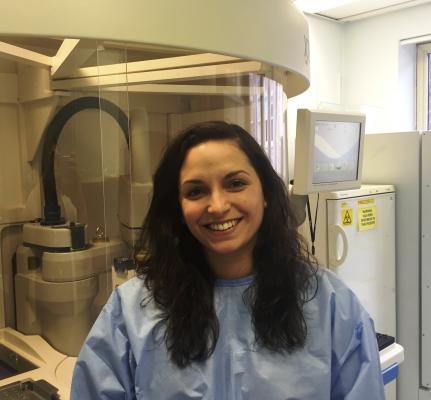Biomedical science
Biomedical scientists conduct laboratory and scientific tests to support the diagnosis and treatment of disease.
You'll be critical to the running of healthcare science laboratories, A&E, operating theatres, many other hospital departments and NHS Blood and Transplant services.
Life as a biomedical scientist
Based in a laboratory, you’ll investigate a wide range of medical conditions from blood disorders and cancer to hepatitis and meningitis.
Your work will be extremely varied and demand both analytical and practical skills.
You’ll screen for diseases and be expected to identify diseases caused by bacteria and viruses, while monitoring the effects of medication and other treatments.
Confidence with technology is important as you’ll work with computers, automated equipment, microscopes and other laboratory instruments.
You’ll have the opportunity to specialise often in one of four areas:
- infection sciences
- blood sciences
- cellular sciences
- genomic or genetic sciences
Ines de Jesus
Biomedical scientist
Read Ines's storyI like liaising with the microbiology consultants to find out more about a patient’s condition. Knowing that you have contributed to a patient’s improvement is very rewarding.

How much can I earn?
You’ll be employed on a national pay and conditions system called Agenda for Change (AfC).
There are nine pay bands and below are examples of the pay band you’ll be on, depending on your role within biomedical science:
Healthcare science assistant e.g. medical laboratory assistant - Bands 2 or 3
- Healthcare science associate practitioner - Band 4
- Trainee Biomedical scientist – Band 4
- Healthcare science practitioner -Band 5 or 6
- Biomedical or Clinical scientist – Band 5 or 6
- Specialist Biomedical Scientist – Band 6
- Consultant scientist - Band 8C/D or medical consultant pay scale (£88,364 to £119,133)
Apprenticeship salaries vary according to employer. Minimum apprenticeship wage is currently £4.81 per hour but many NHS employers pay more.
How about the benefits?
- make a difference
- flexible and part-time working
- high income early in your career
- work anywhere in the world
- excellent pension scheme
- good holiday entitlement
- NHS discounts in shops and restaurants
How to become a biomedical scientist
Becoming a Biomedical Scientist might be easier than you think. You could undertake study at university or find an apprenticeship that takes you straight into a job.
There are assistant or level 2 apprenticeships, associate practitioner roles, level 4 apprenticeships, and degrees, Master’s degree and Higher Specialist Scientist Training for registered and experienced healthcare scientists.
Before applying for a biomedical science degree, you should check that it is accredited by the IBMS. Otherwise, you may have to ‘top-up’ your degree to register as Biomedical scientist with the Health and Professions Council. This can take several years.
If you already have a biomedical science degree, you’ll need the IBMS Certificate of Competence.
See our How to become a healthcare science professional page for the details.
Must-have skills
- emotional resilience, a calm temperament and the ability to work well under pressure
- teamwork and the capacity to lead multidisciplinary teams
- problem-solving and diagnostic skills
- outstanding organisational ability and effective decision-making skills
- first-class time and resource management for the benefit of patient
Entry requirements
- You could look for an entry level job/level 2 apprenticeship – typically GCSEs 9-4/A-C in maths, English and a science.
- If a level 4 apprenticeship feels right for you, you’ll need 5 GCSEs at 9-4/A-C (or equivalent) including maths, English and science or Level 2 Diploma in Healthcare Science
- An associate practitioner role is another route to a career in biomedical science. You’ll likely require foundation degree, or equivalent experience with training and experience to NVQ level 3
- A level 6 biomedical science degree apprenticeship or degree course require relevant level 3 qualifications e.g. three A levels (including at least one science subject) or Access to HE course
- To start the Scientist Training Programme, you’ll need a 1st or 2:1 in relevant first degree or relevant higher degree and 2:2 in any subject
- Higher Specialist Scientist Training is available for registered Clinical Scientists or Senior Biomedical Scientists with relevant MSc or specialist diploma.
What are my chances of starting a career in biomedical science?
There are many opportunities for a career in biomedical science in the NHS, there are currently more than 40,000 posts in England alone. As this is also a growing area in the NHS there are likely to be many opportunities in the future.
Where a career in biomedical science will take you
A career in biomedical science has excellent career and promotion opportunities including specialist laboratory work, expert and consultant roles, research, education and management.
Biomedical scientists work in many different NHS, government and private laboratories, including hospital, NHS Blood and Transplant and the UK Health Security Agency laboratories. Biomedical scientists can progress to other roles within healthcare science specialising in quality, safety, laboratory management, or in the wider pharmaceutical and healthcare science sector.
Displaying 6 - 6 of 6 matches
-
BSc (Hons) Biomedical Science
Manchester Metropolitan University
View courseOpens in a new window
- Study mode
- Full-time
- Duration of the course
- 4 years
- Leading to a career in
- Biomedical science, Healthcare science (Pathology sciences - blood sciences, infection sciences, tissue and cellular diagnostics, genetics)
- Contact details
- Contact Form +44 (0)161 247 2000
- Region
- North West
- Admissions address
- Manchester Metropolitan University
All Saints Building
Manchester
M15 6BH
United Kingdom




